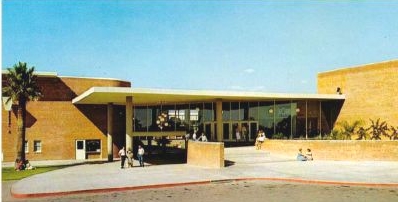Catalina High School, Tucson, Arizona, USA
In the news...
An "exposé" of Catalina High School's rich, wild teenagers!
TEENAGE SECRET MARRIAGE EPIDEMIC
By BETTY COE SPICER
Ladies Home Journal, March, 1960
(Excerpts from a longer article; bold type added by webmaster.)
 Modern Catalina High School is part of one of Tucson, Arizona's plus-$10,000-a-year-income neighborhoods. Often called the "Blueblood High," it is justly proud of its staff, its high scholastic standing and its supervised school activities.
Modern Catalina High School is part of one of Tucson, Arizona's plus-$10,000-a-year-income neighborhoods. Often called the "Blueblood High," it is justly proud of its staff, its high scholastic standing and its supervised school activities.
 Its active, alert P.T.A. has more than doubled attendance at meetings by introducing sharp, informed forum discussions of school problems.
Its active, alert P.T.A. has more than doubled attendance at meetings by introducing sharp, informed forum discussions of school problems.
 So the problem recently given to one P.T.A. study group was doubly startling. It concerned an epidemic of secret high-school elopements.
So the problem recently given to one P.T.A. study group was doubly startling. It concerned an epidemic of secret high-school elopements.
 From Principal R.T. Gridley and other school authorities the group learned details. Twenty girl students at Catalina had married in the single four-month period from December to April. Some were only fifteen years old. Few had parental permission. "At least three quarters" of the marriages were secret, across-the-border ceremonies performed in Mexico, sixty-five miles to the south. In most cases parents were not being told until the girl's pregnancy -- or the young couple's fright at realizing the seriousness of what they had done -- made it impossible to keep the secret any longer. Some such marriages perhaps are still unadmitted.
From Principal R.T. Gridley and other school authorities the group learned details. Twenty girl students at Catalina had married in the single four-month period from December to April. Some were only fifteen years old. Few had parental permission. "At least three quarters" of the marriages were secret, across-the-border ceremonies performed in Mexico, sixty-five miles to the south. In most cases parents were not being told until the girl's pregnancy -- or the young couple's fright at realizing the seriousness of what they had done -- made it impossible to keep the secret any longer. Some such marriages perhaps are still unadmitted.
 Parents in the group looked at one another with shocked eyes.
Parents in the group looked at one another with shocked eyes.
 Like parents all over the country, they were aware of the trend to youthful marriages. And they knew that Tucson's closeness to the border presented special problems. Bordertown Nogales (called "Noggo" by high-schoolers), in the state of Sonora, Mexico, has always been an exciting lure for teenagers. Unchaperoned trips to Nogales were strictly forbidden by nearly all parents.
Like parents all over the country, they were aware of the trend to youthful marriages. And they knew that Tucson's closeness to the border presented special problems. Bordertown Nogales (called "Noggo" by high-schoolers), in the state of Sonora, Mexico, has always been an exciting lure for teenagers. Unchaperoned trips to Nogales were strictly forbidden by nearly all parents.
 Local newspapers sometimes carried stories of narcotic smuggling across the border. Now and then groups of teenage boys drove to Nogales, drank too much and got into fights. There were whispers of "dare" visits by high-school boys to Nogales houses of prostitution. (Prostitution is legalized and controlled in Mexico.) One worried mother quoted her son as saying that the boys had been approached by solicitors who waited near the Tucson schools to suggest these visits.
Local newspapers sometimes carried stories of narcotic smuggling across the border. Now and then groups of teenage boys drove to Nogales, drank too much and got into fights. There were whispers of "dare" visits by high-school boys to Nogales houses of prostitution. (Prostitution is legalized and controlled in Mexico.) One worried mother quoted her son as saying that the boys had been approached by solicitors who waited near the Tucson schools to suggest these visits.
 To most parents, such stories had always seemed to involve "other teenagers. That small percentage of real juvenile delinquents who are as much concern to good teenagers as they are to adults."
To most parents, such stories had always seemed to involve "other teenagers. That small percentage of real juvenile delinquents who are as much concern to good teenagers as they are to adults."
 But this outbreak of secret, across-the-border marriages among their own teenagers cast a new light on the border situation. It was now a frightening problem.
But this outbreak of secret, across-the-border marriages among their own teenagers cast a new light on the border situation. It was now a frightening problem.
 A committee was appointed by the P.T.A. members to try to find the facts in the midst of cloudy rumor.
A committee was appointed by the P.T.A. members to try to find the facts in the midst of cloudy rumor.
 Catalina High P.T.A. president Lucille Retter, mother of two daughters; Mrs. Jack O'Hara, who has three sons currently attending the school; brisk Dorothy Graham, mother of four were among its members.
Catalina High P.T.A. president Lucille Retter, mother of two daughters; Mrs. Jack O'Hara, who has three sons currently attending the school; brisk Dorothy Graham, mother of four were among its members.
 How far had the marriage epidemic spread? Could there be more than twenty of the tragically too-young marriages? Were there youngsters so frightened by what they had done that they did not dare reveal their secret to anyone? Was there a "conspiracy of silence"?
How far had the marriage epidemic spread? Could there be more than twenty of the tragically too-young marriages? Were there youngsters so frightened by what they had done that they did not dare reveal their secret to anyone? Was there a "conspiracy of silence"?
 "Finding answers turned out to be like fighting a fog," one mother says. "Exactly how many secret marriages were there? There wasn't any way of telling. And were the marriages legal?"
"Finding answers turned out to be like fighting a fog," one mother says. "Exactly how many secret marriages were there? There wasn't any way of telling. And were the marriages legal?"
 Teenagers talked to one another about it. One boy reported that after he married, no week went by without some other boy's asking "How do you go about getting married in Nogales?" But only a few talked freely to adults.
Teenagers talked to one another about it. One boy reported that after he married, no week went by without some other boy's asking "How do you go about getting married in Nogales?" But only a few talked freely to adults.
 "It was a crazy thing to do," admitted one girl whose brief, secret marriage ended in divorce. "We'd been going together and we thought we were in love. We heard (I guess every teenage kid in town hears) that it was easy and quick to get married in Nogales and nobody at home had to know about it. It sounded exciting. We left a school dance and drove down. After we got across the border we didn't know where to go. We went into a bar and asked a bartender. He said his brother-in-law was a judge and he'd take care of everything. He did. We lied about our ages. He knew, but he didn't care. It cost us about twenty dollars -- all we had."
"It was a crazy thing to do," admitted one girl whose brief, secret marriage ended in divorce. "We'd been going together and we thought we were in love. We heard (I guess every teenage kid in town hears) that it was easy and quick to get married in Nogales and nobody at home had to know about it. It sounded exciting. We left a school dance and drove down. After we got across the border we didn't know where to go. We went into a bar and asked a bartender. He said his brother-in-law was a judge and he'd take care of everything. He did. We lied about our ages. He knew, but he didn't care. It cost us about twenty dollars -- all we had."
 On the drive back to Tucson they began to feel scared about telling their parents what they had done. It was as if they hadn't really thought about this part of it before. "We won't tell them for a while," they decided. "Unless we get pregnant." Or unless Karen really was sent away to school.
On the drive back to Tucson they began to feel scared about telling their parents what they had done. It was as if they hadn't really thought about this part of it before. "We won't tell them for a while," they decided. "Unless we get pregnant." Or unless Karen really was sent away to school.
 A youth conference was being held in Tucson. A question about the border problem was addressed to Arizona Governor Paul Fannin: "If the stories about youthful drinking, narcotics, vice and 'quickie' marriages are true, don't you think something should be done to keep unescorted teenagers from crossing the border?"
A youth conference was being held in Tucson. A question about the border problem was addressed to Arizona Governor Paul Fannin: "If the stories about youthful drinking, narcotics, vice and 'quickie' marriages are true, don't you think something should be done to keep unescorted teenagers from crossing the border?"
 "I certainly do," said Governor Fannin, and went on to deplore the fact that such things were so easily available to our teenagers. He also deplored the fact that teenagers were so ready to take advantage of them.
"I certainly do," said Governor Fannin, and went on to deplore the fact that such things were so easily available to our teenagers. He also deplored the fact that teenagers were so ready to take advantage of them.
 Newspapers picked up the story. MEXICAN MARRIAGE MILL LURING TUCSON YOUNGSTERS, headlined the Tucson Daily Citizen.
Newspapers picked up the story. MEXICAN MARRIAGE MILL LURING TUCSON YOUNGSTERS, headlined the Tucson Daily Citizen.
 People who had not heard rumors of the situation were shocked to read about it. Did anyone know exactly how many Tucson teenagers had been married in Nogales? The news report brought up a new question. How many of the marriages were performed by qualified officials and how many were performed by "wildcatters" -- unscrupulous operators selling black-market marriages that were not marriages at all?
People who had not heard rumors of the situation were shocked to read about it. Did anyone know exactly how many Tucson teenagers had been married in Nogales? The news report brought up a new question. How many of the marriages were performed by qualified officials and how many were performed by "wildcatters" -- unscrupulous operators selling black-market marriages that were not marriages at all?
 Pima County Attorney Harry Ackerman has had "At least twenty-five phone calls about these Nogales marriages from teenagers or their parents in the past months. Most of them are probably not legal," in his opinion. "They are void, or subject to annulment."
Pima County Attorney Harry Ackerman has had "At least twenty-five phone calls about these Nogales marriages from teenagers or their parents in the past months. Most of them are probably not legal," in his opinion. "They are void, or subject to annulment."
 Intent had a lot to do with it. "If a couple's intent was to evade Arizona's marriage laws (including age requirements) by leaving the state, then their marriage is void."
Intent had a lot to do with it. "If a couple's intent was to evade Arizona's marriage laws (including age requirements) by leaving the state, then their marriage is void."
 Most of the teenage marriages seemed to fall into this category.
Most of the teenage marriages seemed to fall into this category.
 Mr. Ackerman suggested as most ministers and guidance counselors did, that if the marriage was to be accepted, the young couple should be remarried in the United States. If it was not to be accepted, he recomended legal annulment or divorce proceedings. "It is an advantage to have a judicial declaration on record, for the sake of a possible future marriage."
Mr. Ackerman suggested as most ministers and guidance counselors did, that if the marriage was to be accepted, the young couple should be remarried in the United States. If it was not to be accepted, he recomended legal annulment or divorce proceedings. "It is an advantage to have a judicial declaration on record, for the sake of a possible future marriage."
 The Reverend William Hobbs, of Tucson's First Methodist Church, felt: "The border presents a problem with our teenagers, there is no question about that. And the too-young marriages are as serious an aspect as the problem has. I have under counseling now three or four young couples who married in Nogales. Each year I remarry about the same number who have decided to reconfirm vows made perhaps too casually."
The Reverend William Hobbs, of Tucson's First Methodist Church, felt: "The border presents a problem with our teenagers, there is no question about that. And the too-young marriages are as serious an aspect as the problem has. I have under counseling now three or four young couples who married in Nogales. Each year I remarry about the same number who have decided to reconfirm vows made perhaps too casually."
 "We need border controls," Mr. Hobbs goes on. "But we, as parents, can't count on making a border policeman a stand-in for our conscience. We owe it to our children to teach them personal standards of integrity so that they can handle whatever happens to them -- from an auto accident to deciding the right time and place to get married. If we allow our children complete freedom before they are ready for it, we must be prepared to take the consequences."
"We need border controls," Mr. Hobbs goes on. "But we, as parents, can't count on making a border policeman a stand-in for our conscience. We owe it to our children to teach them personal standards of integrity so that they can handle whatever happens to them -- from an auto accident to deciding the right time and place to get married. If we allow our children complete freedom before they are ready for it, we must be prepared to take the consequences."
 I mentioning auto accidents, he pointed out another compelling reason for keeping unescorted teenagers away from the border. Though the Nogales highway is wide and well engineered for safety, its fatal-accident rate is so high that it has become known as El Camino del Muerte, the Road of Death. Drunken driving is blamed in many cases.
I mentioning auto accidents, he pointed out another compelling reason for keeping unescorted teenagers away from the border. Though the Nogales highway is wide and well engineered for safety, its fatal-accident rate is so high that it has become known as El Camino del Muerte, the Road of Death. Drunken driving is blamed in many cases.
 Rabbi Bilgray, of Temple Emanu El, "would not oppose some sort of juvenile-control law at the border. But it should be tempered and intelligent control that tries to make the juvenile see why we are doing it. It must not be just another law on the books -- so harsh a law that it will not be enforced."
Rabbi Bilgray, of Temple Emanu El, "would not oppose some sort of juvenile-control law at the border. But it should be tempered and intelligent control that tries to make the juvenile see why we are doing it. It must not be just another law on the books -- so harsh a law that it will not be enforced."
 At first other high schools in the city had said that they would like to join Catalina's parents' group in studying the youthful marriage problem. Now they changed their minds. "We feel that the percentage of married students in our schools is too small to present a major problem."
At first other high schools in the city had said that they would like to join Catalina's parents' group in studying the youthful marriage problem. Now they changed their minds. "We feel that the percentage of married students in our schools is too small to present a major problem."
 "Maybe the percentage is small," one embittered parent said. "But it gets a whole lot bigger if your own son or daughter is part of it!"
"Maybe the percentage is small," one embittered parent said. "But it gets a whole lot bigger if your own son or daughter is part of it!"
 "I can't believe that Catalina is alone in this secret teenage marriage thing," a committee member said firmly.
"I can't believe that Catalina is alone in this secret teenage marriage thing," a committee member said firmly.
 Many Tucsonians felt that Catalina was "greatly to be commended for not turning its back on the situation, but bringing it out into the open and recognizing that it is a problem."
Many Tucsonians felt that Catalina was "greatly to be commended for not turning its back on the situation, but bringing it out into the open and recognizing that it is a problem."
 "Not really the schools' problem, either," said Mrs. Retter, "but ours, as parents."
"Not really the schools' problem, either," said Mrs. Retter, "but ours, as parents."
 Dr. Robert Morrow, superintendent of Tucson schools, saw the rash of teenage marriages as "A matter for concern, certainly, but no cause for panic. Even one or two student marriages present a problem if the children go into marriage without their parents' consent and without realizing what they are doing. But I do not believe that Tucson's high-school marriage rate is unusual. I don't think we have many secret marriages."
Dr. Robert Morrow, superintendent of Tucson schools, saw the rash of teenage marriages as "A matter for concern, certainly, but no cause for panic. Even one or two student marriages present a problem if the children go into marriage without their parents' consent and without realizing what they are doing. But I do not believe that Tucson's high-school marriage rate is unusual. I don't think we have many secret marriages."
 The number of acknowledged married students currently attending the four city high schools: Tucson High, with an enrollment of 2300, had four married girls and one married couple. Of Pueblo High's 1800 students there were three married girls, two married boys and two who had just dropped out of school. Rincon High (2400 enrollment) duplicated Pueblo High's figures. Of Catalina's 2500 students, the official figures were seven married girls, five married boys and one couple.
The number of acknowledged married students currently attending the four city high schools: Tucson High, with an enrollment of 2300, had four married girls and one married couple. Of Pueblo High's 1800 students there were three married girls, two married boys and two who had just dropped out of school. Rincon High (2400 enrollment) duplicated Pueblo High's figures. Of Catalina's 2500 students, the official figures were seven married girls, five married boys and one couple.
 (Of these figures one student said positively, "I think they are mistaken. I know of at least twenty-five marriages. And ten more that are planned.")
(Of these figures one student said positively, "I think they are mistaken. I know of at least twenty-five marriages. And ten more that are planned.")
 Why were there more student marriages at Catalina than at the other high schools?
Why were there more student marriages at Catalina than at the other high schools?
 Dr. Morrow thought it was a matter of economic location. "There are more kids with money at Catalina than at some of the other schools. Fewer students are required to work at jobs: they have more time on their hands. More boys have cars. More families in that area can afford to support children who marry, so that they can stay on in school."
Dr. Morrow thought it was a matter of economic location. "There are more kids with money at Catalina than at some of the other schools. Fewer students are required to work at jobs: they have more time on their hands. More boys have cars. More families in that area can afford to support children who marry, so that they can stay on in school."




